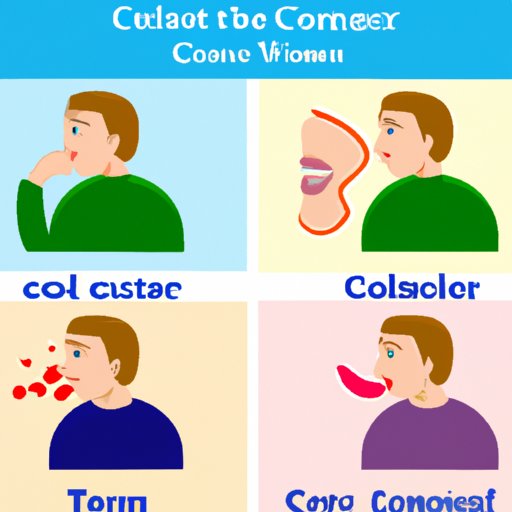
Introduction
A cold is a common viral infection that affects millions of people every year. It is an illness that can last up to two weeks and results in a runny nose, congestion, sneezing, and coughing. In addition to these symptoms, many people also experience a loss of taste while they have a cold. Losing your sense of taste can be frustrating, especially when you’re trying to enjoy your favorite foods. In this article, we’re going to explore the science behind taste, the connection between a cold and taste loss, and provide solutions to help you regain your sense of taste.
Why You Can’t Taste Anything When You Have a Cold: Understanding the Science Behind It
Taste is a complex sense that is detected by taste buds on the tongue. Taste buds are small sensory organs that are responsible for detecting sweet, salty, sour, bitter, and umami (savory) flavors. When food or drinks come into contact with your taste buds, receptors on the surface of the taste buds send signals to the brain, which translates them into the taste you experience.
When you have a cold, the virus attacks your respiratory system, including your nose and throat. The congestion and inflammation caused by the virus can affect your sense of smell and taste. The ability to taste is closely linked to the ability to smell. In fact, 80% of what we perceive as taste actually comes from our sense of smell. When the mucous membranes in your nose become inflamed and congested, they can block the flow of air to the olfactory receptors in your nose. This can make it difficult to smell the food you are eating, which in turn can affect your ability to taste it.
Studies have shown that the loss of taste is a common symptom of a cold, affecting up to 25% of people with a cold. It typically occurs in the early stages of the cold and can last for up to two weeks.

The Common Cold and Temporary Taste Loss: Causes and Treatment
The common cold is a viral infection that affects the upper respiratory tract. It is caused by a virus and is highly contagious. Symptoms of a cold include a runny nose, congestion, a sore throat, and coughing. It is also common to experience a temporary loss of taste during a cold.
There are a few reasons why a cold can cause a temporary loss of taste. Firstly, the congestion and inflammation in your nose and throat can affect your sense of smell, which in turn can affect your sense of taste. Secondly, the virus can cause a disruption to the function of your taste buds. The virus can attach to the surface of the taste buds, causing them to become inflamed and less sensitive to flavors.
There are several home remedies that can help alleviate temporary loss of taste caused by a cold. Firstly, it’s important to stay well hydrated. Drinking plenty of water, fruit juices and warm fluids like tea and soup can help keep the mucous membranes in your nose and throat moist, which can reduce inflammation and help restore your sense of taste. Secondly, you can try using a saline nasal spray or rinse to help reduce congestion and inflammation in your nasal passages. Thirdly, try adding a bit more seasoning or spice to your food to make up for the reduced sensitivity of your taste buds.
Uncovering the Relationship between a Cold and Your Taste Buds
The common cold effects many different parts of the body, including your taste buds. Experts believe that there is an important link between the common cold and the taste buds. Research suggests that taste buds have an important role in the body’s immune response to viral infections.
When a virus enters the body, it can trigger an immune response in the taste buds. This response can cause the taste buds to become inflamed and less sensitive to flavors. This is why many people experience a loss of taste when they have a cold.
How a Runny Nose Affects Your Sense of Taste: Explained by Experts
A runny nose is another common symptom of a cold and can also have an impact on your sense of taste. When you have a cold, the virus causes inflammation in your nasal passages. This causes the glands in your nose to produce excess mucus, leading to a runny nose. The excess mucus can make it difficult for food smells to travel from your mouth to your olfactory receptors. Without the ability to smell the food, you may find that your sense of taste is reduced.
Experts suggest that blowing your nose regularly and using a nasal spray or saline rinse can help reduce mucus production and help restore your sense of taste. Drinking warm fluids like tea and soup can also help to soothe a sore throat and reduce mucus production.
Surviving a Cold: Tips to Regain Your Sense of Taste
If you’re experiencing a loss of taste due to a cold, there are several things you can do to help regain your sense of taste. Firstly, make sure you’re staying well hydrated by drinking plenty of water and warm fluids like tea and soup. Secondly, try using a saline nasal spray or rinse to help reduce congestion and inflammation in your nasal passages. Thirdly, practice good oral hygiene, such as brushing your teeth and using mouthwash, to help keep your mouth clean and fresh. Fourthly, try eating spicier or more flavorful foods to help make up for the reduced sensitivity of your taste buds.
What to Expect When You Have a Cold and Lose Your Sense of Taste
If you’re experiencing a loss of taste due to a cold, it’s important to understand that it is a temporary symptom that will usually resolve on its own within a few weeks. While you wait for your sense of taste to return, it is important to maintain good oral and nasal hygiene to help minimize infection and prevent further inflammation. You may also want to adjust your diet to make up for the reduced ability to taste.
Foods to Eat When You Lose Your Taste Due to a Cold
If you’re experiencing a loss of taste due to a cold, it doesn’t mean that you can’t enjoy food. There are still plenty of foods that are enjoyable even with limited taste. Some good options include hot beverages like tea and coffee, which can help soothe a sore throat and provide warmth, brothy or soupy meals that are full of flavor, and spicy options that can help provide a burst of taste. You can also try including more fruits and vegetables in your diet to help boost your nutrient intake.
Conclusion
A cold is a common viral infection that can result in a loss of taste. Understanding the science behind this symptom is important to help you manage and alleviate it. If you’re experiencing a loss of taste while you have a cold, it’s important to stay well hydrated, practice good oral and nasal hygiene, and adjust your diet to make up for the reduced sensitivity of your taste buds. By following these tips, you can help reduce the impact of a cold on your sense of taste and maintain good health.





